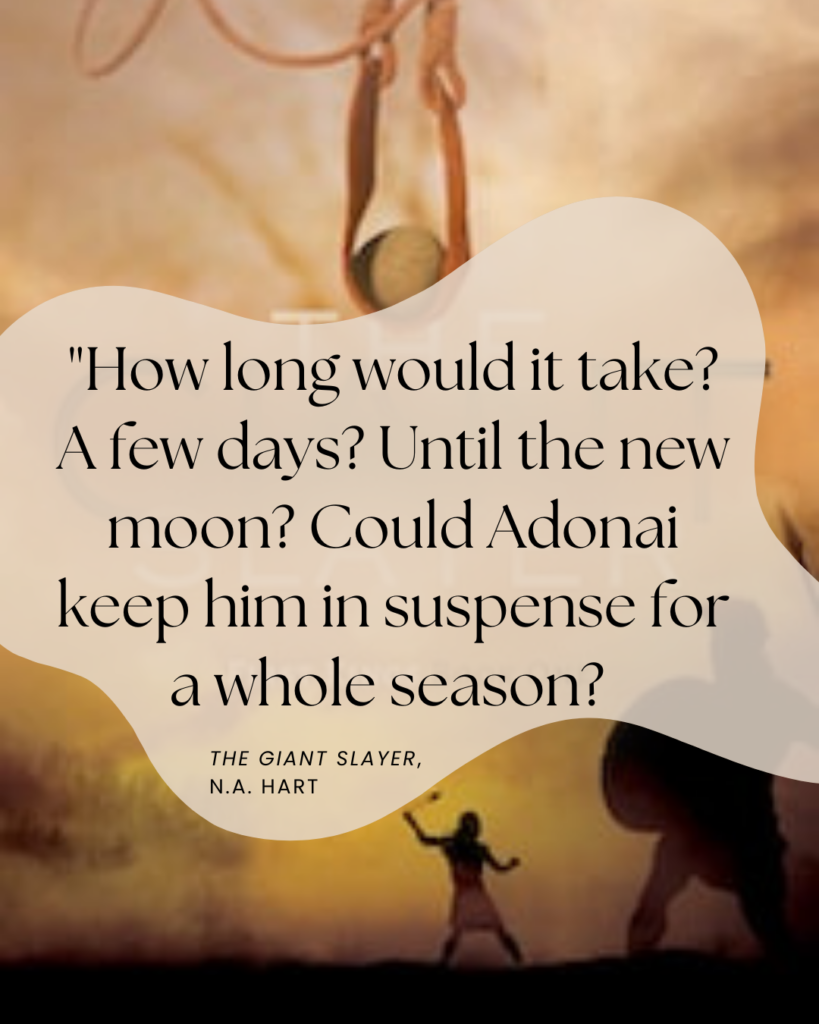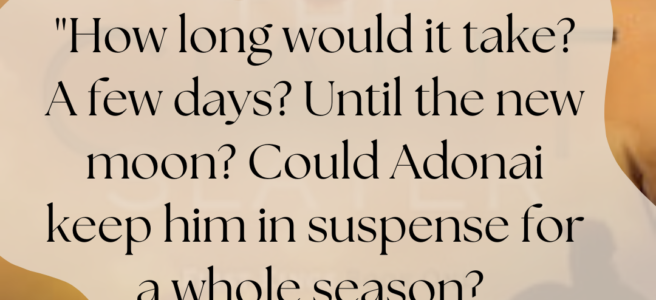
One of my favorite moments in The Giant Slayer is when young David, having just been anointed by Samuel, who won’t tell him why, wonders,
How long would it take? A few days? Until the new moon? Could Adonai keep him in suspense for a whole season?
It’s adorable. His disbelief that God might make him wait a whole season.
Of course, it’s not nearly so cute when God is making me wait.
Back in November 2021 I was at a retreat at The Transforming Center. It was a gift to the staff and church leaders from my boss and pastor who was about to retire. And it truly was a gift. After a year and a half of doing ministry during COVID, I needed a retreat. They actually gave us time to listen to what God might be trying to say to us–like, hours, not just a token 10 minutes before a session.
One of the best things I did there was grieve: grieve what COVID stole from me, from all of us, grieve the upcoming loss of my pastor. I needed a good cry and I got it. The retreat gave me the space and time to get out of management mode so I could recognize what emotions I needed to process, and then begin to process them.
But then I sensed that God was promising me rest–not just rest for that day, but capital-R Rest. My response,
That’s adorable.
Other than those few days, I would get no chance for rest in the near future. In fact, I knew that the near future would be busier than ever. What a hilarious thing for God to promise me.
With the pastor retiring and me on the celebration committee, I’d be going full steam ahead on all the party plans as soon as we got back, and that was on top of my normal 5 part-time jobs. And then once he retired, I’d be on the transition team tasked with searching for and calling a new pastor. And the children were finally coming indoors for ministry so there was extra COVID-planning and -proofing to do. And the middle school youth group was finally going to start up. That was just what I knew. I didn’t anticipate that fewer people would return to church and that even fewer would want to come back to volunteering so finding people to do ministry things would become even more torturous. Or that the worship director and associate worship director would leave the church. That more and more and more responsibility would fall into my hands.
Jim Gaffigan tells a great joke about what it’s like having 5 children: “Imagine you’re drowning. And then someone hands you a baby.” Here’s a church-staff-coming-out-of-COVID version:
Imagine you’re doing everything normal plus extra to try to connect everyone virtually and hold the church together. And then some people come back and are so excited for what you were doing and so glad to be there, but you wind up with more to do and nothing taken away. And the thing is that you love these people. They are your church family. You know they’ve had an exhausting pandemic, too, so you don’t want to burden them or ask too much of them. So you shoulder it yourself.
I began to see that a new job could be part of God’s promised rest. The end of July 2022 I traded one part-time job for a full-time job with benefits. The end of December I left my church, my denomination, and two more of my part-time jobs (the stress of which brought me 10 additional pounds and three vertigo attacks in 6 weeks). I’ll free myself of one more tiny job by the spring, and I’ll keep one that is faith and justice related and only a couple of hours a month.
It took 14 months since God promised me Rest for me to reach the conditions that would make it possible. I am so grateful.
But here’s the thing I’ve realized: I’ve been running on adrenaline, in emergency survival mode, since the three police officers walked up my porch steps to arrest my now-ex-husband for a sex crime. Over 7 years ago. That’s why I managed COVID so well — I was already in a state of emergency, so I could just fold that in.
I know how to escape, chill out, have fun. But capital-R Rest? No idea. I had a tiny taste of it last week on Tuesday evening and I cried.
How long until I re-learn Rest? How long until I step out of the high-alert pathways? Until I no longer constantly clench my jaw, my stomach, my glutes, my legs? Until my left eyelid stops twitching? My heart stops randomly beating hard?
A few days? A month? A whole season?
That’s adorable. I think it’s going to take a long time.
